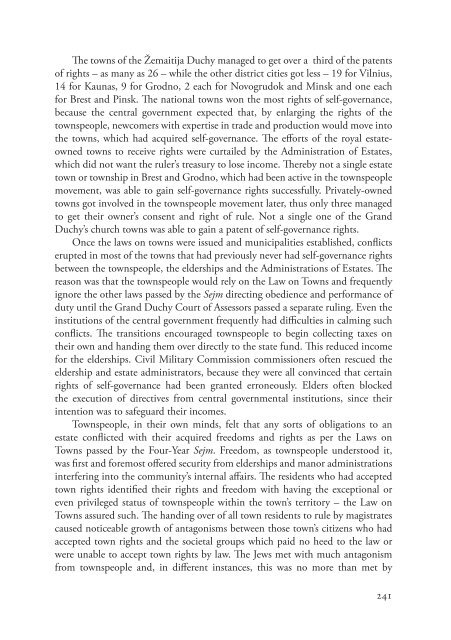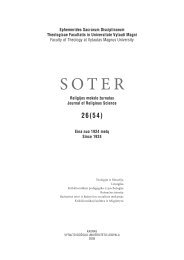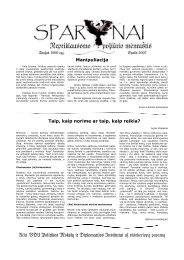Untitled - Vytauto Didžiojo universitetas
Untitled - Vytauto Didžiojo universitetas
Untitled - Vytauto Didžiojo universitetas
Create successful ePaper yourself
Turn your PDF publications into a flip-book with our unique Google optimized e-Paper software.
The towns of the Žemaitija Duchy managed to get over a third of the patents<br />
of rights – as many as 26 – while the other district cities got less – 19 for Vilnius,<br />
14 for Kaunas, 9 for Grodno, 2 each for Novogrudok and Minsk and one each<br />
for Brest and Pinsk. The national towns won the most rights of self-governance,<br />
because the central government expected that, by enlarging the rights of the<br />
townspeople, newcomers with expertise in trade and production would move into<br />
the towns, which had acquired self-governance. The efforts of the royal estateowned<br />
towns to receive rights were curtailed by the Administration of Estates,<br />
which did not want the ruler’s treasury to lose income. Thereby not a single estate<br />
town or township in Brest and Grodno, which had been active in the townspeople<br />
movement, was able to gain self-governance rights successfully. Privately-owned<br />
towns got involved in the townspeople movement later, thus only three managed<br />
to get their owner’s consent and right of rule. Not a single one of the Grand<br />
Duchy’s church towns was able to gain a patent of self-governance rights.<br />
Once the laws on towns were issued and municipalities established, conflicts<br />
erupted in most of the towns that had previously never had self-governance rights<br />
between the townspeople, the elderships and the Administrations of Estates. The<br />
reason was that the townspeople would rely on the Law on Towns and frequently<br />
ignore the other laws passed by the Sejm directing obedience and performance of<br />
duty until the Grand Duchy Court of Assessors passed a separate ruling. Even the<br />
institutions of the central government frequently had difficulties in calming such<br />
conflicts. The transitions encouraged townspeople to begin collecting taxes on<br />
their own and handing them over directly to the state fund. This reduced income<br />
for the elderships. Civil Military Commission commissioners often rescued the<br />
eldership and estate administrators, because they were all convinced that certain<br />
rights of self-governance had been granted erroneously. Elders often blocked<br />
the execution of directives from central governmental institutions, since their<br />
intention was to safeguard their incomes.<br />
Townspeople, in their own minds, felt that any sorts of obligations to an<br />
estate conflicted with their acquired freedoms and rights as per the Laws on<br />
Towns passed by the Four-Year Sejm. Freedom, as townspeople understood it,<br />
was first and foremost offered security from elderships and manor administrations<br />
interfering into the community’s internal affairs. The residents who had accepted<br />
town rights identified their rights and freedom with having the exceptional or<br />
even privileged status of townspeople within the town’s territory – the Law on<br />
Towns assured such. The handing over of all town residents to rule by magistrates<br />
caused noticeable growth of antagonisms between those town’s citizens who had<br />
accepted town rights and the societal groups which paid no heed to the law or<br />
were unable to accept town rights by law. The Jews met with much antagonism<br />
from townspeople and, in different instances, this was no more than met by<br />
241





